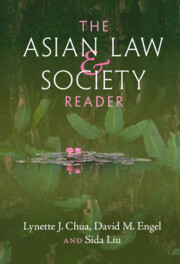Book contents
- Reviews
- The Asian Law and Society Reader
- The Asian Law and Society Reader
- Copyright page
- Dedication
- Contents
- Detailed Table of Contents
- Acknowledgments
- Publisher’s Acknowledgments
- Introduction
- 1 Religion
- 2 Legal Pluralism
- 3 Disputing
- 4 Legal Consciousness
- 5 Legal Mobilization
- 6 Legal Professions
- 7 Courts
- 8 Crime and Justice
- 9 Practicing Law and Society Scholarship in Asia
- Index
- References
1 - Religion
Published online by Cambridge University Press: 02 March 2023
- Reviews
- The Asian Law and Society Reader
- The Asian Law and Society Reader
- Copyright page
- Dedication
- Contents
- Detailed Table of Contents
- Acknowledgments
- Publisher’s Acknowledgments
- Introduction
- 1 Religion
- 2 Legal Pluralism
- 3 Disputing
- 4 Legal Consciousness
- 5 Legal Mobilization
- 6 Legal Professions
- 7 Courts
- 8 Crime and Justice
- 9 Practicing Law and Society Scholarship in Asia
- Index
- References
Summary
This chapter contains readings on Hinduism, Buddhism, Islam, Confucianism, Taoism, and localized so-called “animist” religions based on spirits and nature. Although in premodern legal systems, law and religion were virtually indistinguishable, “modernity” required a separation of the two concepts. The readings address the arrival of European-style legal systems, often (but not always) imposed by colonial authorities, which carried with them some version of the principle of “secularism.” In fact, secularism took on many different forms in Asian societies, each marking out a distinctive role for law, in some instances to police the separation of law and religion and, in other instances, to ensure that a particular religion retained a preferred place in society. The chapter concludes with readings about modern interactions between law and religion in three very different societies—Singapore, Sri Lanka, and Japan.
- Type
- Chapter
- Information
- The Asian Law and Society Reader , pp. 19 - 73Publisher: Cambridge University PressPrint publication year: 2023

